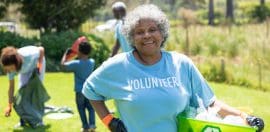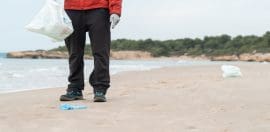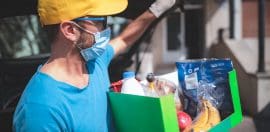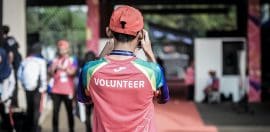For those that do hold a hose

20 May 2021 at 8:56 am
Research reveals that volunteering has been smashed by COVID-19. It will not come back on its own, it requires investment, writes David Crosbie, who calls on governments, policy makers, philanthropists, charities and not for profits to all prioritise volunteering.
It is National Volunteer Week and it has been uplifting to see the extensive public acknowledgement of the role volunteers play in our communities.
Through the catastrophic bushfires and the ongoing pandemic, the preparedness of thousands of volunteers to put themselves in harm’s way for the benefit of all of us has never been more important.
There is something rather remarkable about the level of volunteering in Australia. In many ways, we are world leaders. Our rates of volunteering are well above most comparable countries. While it is hard to get good comparable data in this area, the available research indicates Australians volunteer at a much higher rate than the OECD average and well above the average of G7 nations.
The latest ACNC data suggests 3.6 million Australians volunteered with a charity in 2019. Around 50 per cent of all charities are run entirely by volunteers and many others rely extensively on volunteer time and commitment to operate. Of course, these are pre COVID-19 statistics.
New research conducted by Prof Nicholas Biddle and Prof Matthew Gray of the Australian National University Centre for Social Research and Methods to be released today presents some concerning findings:
- The proportion of adult Australians doing voluntary work has fallen very substantially since COVID-19. In April 2021, 24.2 per cent of Australians had done voluntary work in the previous 12 months, down from 36 per cent in late 2019.
- Although many of the lockdown and social distancing restrictions had eased across Australia by April 2021, many of those who had previously volunteered but had stopped doing so had not returned to volunteering.
- There are an estimated 2.3 million less Australians volunteering in April 2021 than there were in late 2019. The data suggests that unpaid work has been impacted even harder by the COVID-19 recession than paid work, at least in terms of relative decline (that is, unpaid work declined at a higher rate than paid work).
- The total number of hours of volunteering is estimated to have fallen by around 293 million hours over a 12-month period since COVID. This implies that the loss in economic output due to the pandemic would be 16.1 per cent higher if volunteering was included, compared to paid work only.
- There were declines in volunteering for both males and females, with slightly larger declines for females. All age groups experienced a decline in volunteering. The age group that had the largest fall in volunteering is 45 to 54 years.
- There was a smaller decline in the probability of volunteering for people living in non-capital cities.
This ANU research clearly reveals that volunteering has been smashed by COVID-19. The Australian tradition of high levels of volunteering is now at significant risk. With only 24.2 per cent of Australians having volunteered in the last 12 months, Australia would be well below the previous OECD and the G7 averages.
Unfortunately, the loss of volunteers seems to attract limited attention. It seems many people think volunteers will just keep turning up no matter what, because that is the spirit that has informed so many volunteers over many decades. The real story is much more complex.
We know many volunteers have been turned away during the pandemic. The potential for contracting or spreading COVID-19 presents a whole new set of obstacles to volunteering like: what happens if a volunteer contracts COVID-19; is there an insurance policy for volunteers exposed to high risk COVID-19 situations; how do we manage a volunteer having to quarantine for 14 days because they were in a hot spot; who compensates volunteers for their lost paid work salaries in a COVID-19 situation; do we have enough PPE to provide all at risk volunteers with protective clothing? There are solutions to all these issues, but they require investment.
It is not just COVID-19 or even bushfires that present barriers to volunteering in Australia. Almost every aspect of volunteer registration, training certification and listing of volunteer acquired skills is buried in fragmented systems across Australia.
We know tens of thousands of potential volunteers were turned away during the bushfires in 2019 and 2020, not because there was no work for them to do, but because there was no infrastructure to support them. Again, volunteering does not just happen, it requires investment.
Over the past week many organisations and individuals have been effusive in their praise for the vital contribution volunteers make to our communities. Politicians have joined the chorus, and yet the level of resourcing to support volunteers, particularly at a national level, is pathetically inadequate – no national volunteer registration process, no national volunteer insurance process, no national accreditations process, no national online directory of volunteers or volunteering opportunities. The last national volunteering strategy was a decade ago in 2011. Some good work is being done by some groups in some jurisdictions, but generally navigating volunteering systems in Australia is very hit and miss.
Volunteers are not putting on aprons, high visibility vests, work gloves or hard hats just for the photo opportunities. Volunteers are not seeking personal gain, and their value extends well beyond individual economic unit contributions to the broader Australian economy. Volunteers are not just giving time, knowledge, experience and effort, they are building something that sustains us all, they are building our communities.
Now more than ever as we seek to build back better incorporating sustainable ways to live with COVID-19, we need to get volunteers back into our charities and our community organisations. It would not take that much to ensure the massive Australian volunteer workforce was given a bit of assistance to come back into our organisations, to return to their crucial roles supporting our communities.
Governments, policy makers, philanthropists, charities and not-for-profit groups all need to prioritise volunteering. The data is very clearly indicating that blindly hoping for things to return to pre-COVID-19 levels is not working.
It is good that we take the time to offer our gratitude, to acknowledge the importance of volunteering. It would be even better if more of us became part of the movement calling for volunteers to get better treatment, to make it easier and more fulfilling for volunteers to contribute their invaluable time and energy supporting us all.







